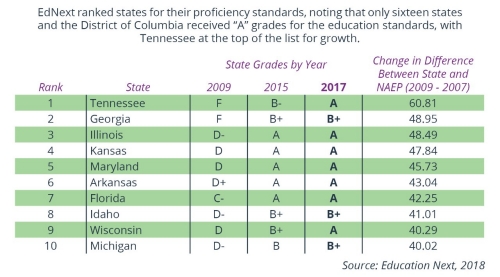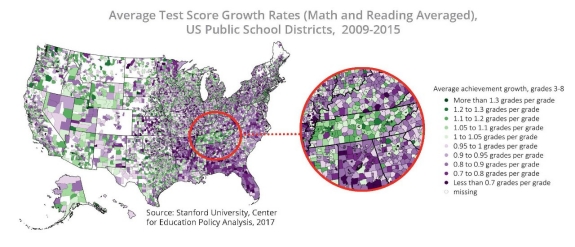Tennessee’s Education Transformation

Tennessee Recognized for Rigorous Proficiency Standards and Ranks Top in Country for Improvement of Standards
A May 2018 report from Education Next gave Tennessee an “A” for the state’s academic standards, noting that the TNReady assessment is rigorous and provides feedback similar to the National Assessment of Educational Progress (NAEP). The report also noted that Tennessee, which received an “F” for its standards in 2009, was the state with the greatest improvement in closing the “honesty gap” between state assessments and national benchmarks. Another 2018 report from Achieve notes that Tennessee was among the top seven states in eliminating the honesty gap and the gap was narrowed in every content area and grade in Tennessee.
Tennessee first committed to raising its education standards in 2007 after receiving an “F” from the U.S. Chamber of Commerce for low academic expectations and for truth in advertising on K-12 education. Under current Tennessee Governor Bill Haslam, Tennessee implemented new academic standards and launched a new assessment known as TNReady. The studies released in 2018, which both praise Tennessee’s new standards and assessment, are the first in which the state was evaluated on the new TNReady assessment. (Click here for more information from the Tennessee Department of Education.)
Tennessee Stands out for Progress in Education Growth

In December 2017, Stanford University released a map of student growth in public school districts across the country. One state stood out on the map for its increases in educational achievement: Tennessee.
The map demonstrates that student achievement in Tennessee is growing- and quickly. Only a decade ago, Tennessee stood near the bottom of most education rankings. Governor Bill Haslam and other state leaders have been determined to create a better education environment for students. In the last decade, Tennessee has aggressively pursued education reform to increase educational opportunity for all citizens and create long-term benefits for the state. U.S. News and World Report noted, “Tennessee has remained focused on education as a way to drive improvements in other parts of the state, including health care and employment.”

The state's relentless focus on education means increasing student achievement at the K-12 level and ensuring that every student is prepared and able to attend college. Through the Tennessee Promise scholarship program, all high school graduates in Tennessee can attend a community or technical college tuition-free. Tennessee Promise is part of Governor Haslam’s Drive to 55, a challenge to get 55 percent of Tennesseans to hold a degree or credential by the year 2025 to meet future workforce demands.

The increasing NAEP rankings show that Tennessee is well on the path to meeting our achievement goals. The state set a goal in the 2015 strategic plan for education, Tennessee Succeeds, to move Tennessee into the top half of states in NAEP rankings. The fourth grade math scores are already meeting that goal and the state’s latest NAEP results in science received national attention for being at the top in growth and achievement gap, moving to 19th and 21st, respectively, in fourth and eighth grade science.
Tennessee has also had other historic success marked this year with the highest graduation rate in the state’s history at 89.1 percent and the highest ACT average ever at 20.1. And, to ensure readiness for postsecondary, we have seen the largest jump in early postsecondary course taking and credit attainment, and the number of students requiring learning support when entering community college has decreased.
Investing in education, from pre-K to postsecondary, is paying off for Tennessee. Student achievement is increasing and educational attainment rates are rising; our state has momentum and is on a trajectory to meet the economic demands of the future.